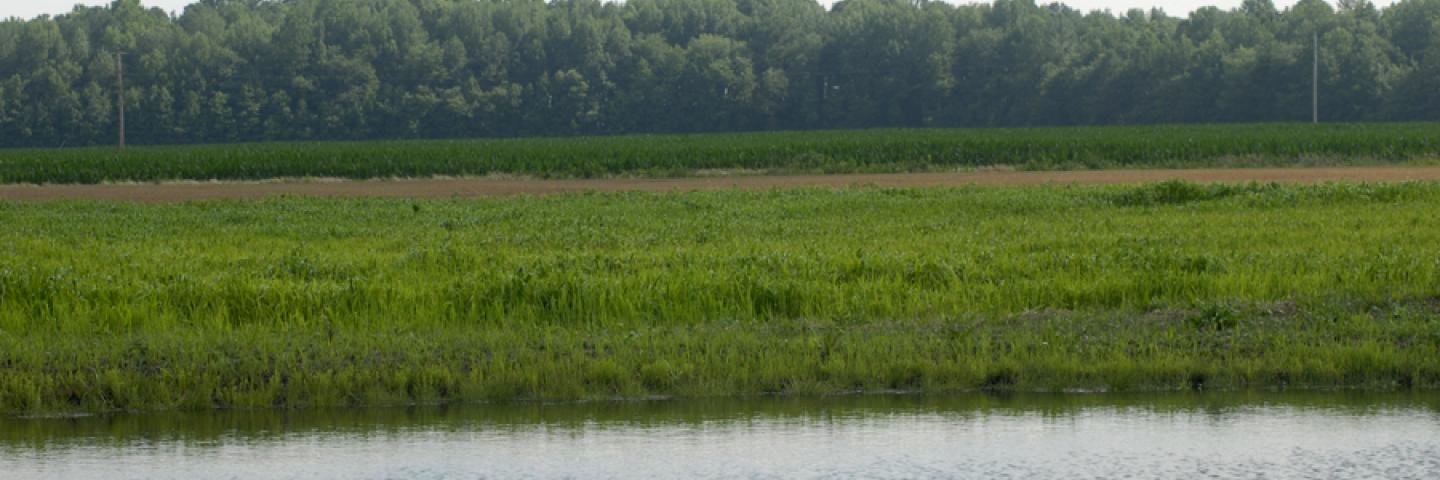
NRCS in Delaware uses science-based technology to provide technical assistance to land owners, land operators and others to benefit the soil, water, air, plants, and animal for productive lands and healthy ecosystems.
Agronomy
Agronomy refers to the application of soil and plant sciences to soil management and crop production. Delaware NRCS uses a variety of agronomic conservation practices to conserve natural resources such as soil erosion and water quality, increase crop yields and soil quality, and properly manage nutrients and pesticides.
Biology
The general term “Biology” used within the NRCS is primarily used to represent land-based and aquatic organisms and their habitats. The primary objectives related to biological resources such as fish and wildlife and their habitats are:
- To restore, create, maintain, or enhance terrestrial and aquatic habitat that can attract, support, or produce wildlife and aquatic organisms.
- To conserve the habitats of wildlife and aquatic organisms and to minimize or avoid damage to habitat from changes in land use or from installation of soil, water, animals, plants, air, and related human resource conservation measures.
Conservation Reserve (Enhancement) Program -Technical Support
NRCS provides technical support for the Conservation Reserve Program (CRP) and Conservation Reserve Enhancement Program (CREP). Both programs are administered by the USDA Farm Service Agency.
Conservation Reserve Program (CRP)
CRP is a voluntary program that works with landowners to establish long-term conservation practices on highly erodible and environmentally sensitive land in exchange for 10-15 years of annual rental payments. Click here for more.
Technical Contact: Jayme Arthurs, State Resource Conservationist
Phone: (302) 678-4191
Email: Jayme.Arthurs@usda.gov
Conservation Reserve Program (CRP)
CREP is a cooperative program between USDA and the State of Delaware to improve and protect water quality of streams and wildlife habitat in the watersheds of the Chesapeake, Delaware and Inland Bays. Annual rental and cost-share payments are paid by both USDA and Delaware on 10-15 year contracts. Five practices are offered under the Delaware CREP: Hardwood tree planting, wildlife habitat, grassed filter strips, riparian buffers, and wetland restoration. Click here for more.
Technical Contact: Patti Web, CREP Coordinator
Phone: (302) 678-4250 (FSA's main line)
Email: patti.webb@delaware.gov
Geographic Information Systems (GIS)
GIS is a system for capturing, storing, analyzing and managing data and associated attributes which are spatially referenced to the earth. NRCS in Delaware uses GIS applications to produce farm maps and plans for their customers.
Technical Contact: Art Walker, GIS Specialist
Phone: (302) 743-0527
Email: arthur.walker@usda.gov
Nutrient Management
Comprehensive Nutrient Management Plans (CNMP’s) are conservation plans that are unique to livestock and poultry operations. These plans document the practices and strategies adopted by the land owner or operator to address the natural resource concerns related to soil erosion, water quality, utilization of manure, and disposal of organic by-products.
Pest Management
Pest Management in NRCS is primarily focused on helping producers mitigate the environmental risks of pest control activities, including pesticide risks to soil, water air, plants, animals, and humans.
Pest Management | Natural Resources Conservation Service (usda.gov)
Poultry Environmental Assessment
The 2018 Farm Bill provides flexibility for producers to use federal technical and financial assistance through NRCS’ Environmental Quality Incentives Program (EQIP) to address new or expected resource concerns. However, the current Environmental Quality Incentive Program (EQIP) eligibility policy requires there to be an existing resource concern present on a farm at time of program application.
To provide the required assistance needed to address these new and expected resource concerns, Delaware NRCS in collaboration with NRCS National Headquarters, must execute a standalone poultry environmental assessment (EA).
Soil Health
Healthy soil is the key to making farms more productive, profitable and resilient—and better prepared to meet the challenges of the 21st century. Soil health is also important to every U.S. consumer because cover crops and soil health management systems positively impact drinking water quality, and usability of recreational surface waters. Those systems reduce sediment loss from farms; sequester carbon, and create biodiversity in our rural landscape.
The resources on this section of our site are designed to help you understand the basics and benefits of soil health—and to learn about Soil Health Management Systems from some of the farmers who are using those systems.
Delaware Digs Healthy Soils Website- The Delaware Soil Health Partnership website is a one-stop shop for Delaware farmers and partners to find upcoming events, presentations, soil health related resources, and much more. While there, be sure to join the mailing list for updates! #healthysoils
The soils team in Delaware provides scientifically defensible and timely delivery of technical soils information to internal and external partners to meet their ever-changing resource challenges. Accurate soils information is the foundation on which NRCS and many partners base their resource initiatives on.

